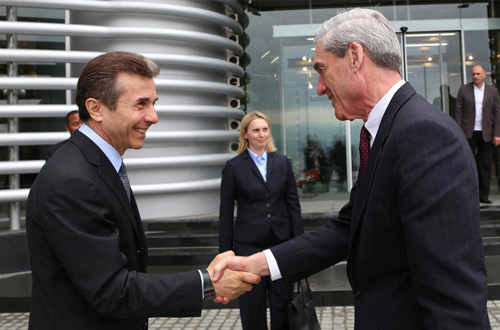
FBI Director Mueller’s Visit to Georgia Highlights Bilateral Counter-Terrorism Cooperation
Publication: Eurasia Daily Monitor Volume: 10 Issue: 92
By:

On May 8, Robert Mueller, the director of the Federal Bureau of Investigation (FBI), visited Georgia. The official reason for the visit was to assess the terrorism risks in the region in connection with the 2014 Winter Olympics in Sochi. “The FBI is responsible for protecting Americans against terrorism, and so in the run up to the Sochi Olympics, Mr. Mueller has been consulting throughout the region on what can be done to protect the athletes at the upcoming Olympic Games,” United States Ambassador to Georgia Richard Norland said at a press conference (https://www.civil.ge/eng/article.php?id=26036). The FBI director met with Prime Minister Bidzina Ivanishvili behind closed doors, and he also he spoke face-to-face with Minister of Justice Tea Tsulukiani and other authorities from the Georgian law enforcement agencies (https://www.vesti.az/news/157787). Mueller was not able to meet Georgian Interior Minister Irakly Garibashvili, however, who was on a visit to Israel at the time. The Georgian Ministry of Internal Affairs is responsible for fighting terrorism as this government body includes the Department of Counterintelligence as well as Georgia’s Anti-Terrorist Center.
The press services of the prime minister and the interior ministry limited their official press releases to brief comments about the talks held with the top FBI official and the essence of his discussion with the Georgian authorities. “The question of deepening cooperation was discussed at the talks with Mueller. The two sides conferred about mutual interaction, including the law enforcement field,” the prime minister’s press release said vaguely (https://1tv.ge/news-view/50021?lang=en). “Director Mueller underscored the solid partnership and successful history of cooperation between the FBI and Georgian law enforcement and received assurances that the Ministry of Internal Affairs and the Ministry of Justice will remain strong partners of the FBI in the future,” the US embassy reported (https://georgia.usembassy.gov/latest-news/pressreleases2013/fbi_director_tbilisi.html).
The official sources did not specify in what context the cooperation on fighting terrorism between the two sides was discussed and what questions were raised. However, judging by the circumstantial evidence and unofficial sources, the safety of athletes in Sochi was not the only topic of interest during talks between Robert Mueller and Prime Minister Ivanishvili and officials from the Georgian interior ministry.
It is noteworthy that the FBI director arrived in Tbilisi from Moscow, where he held talks on cooperation with Russian security services pertaining to the investigation of the April 15 terrorist attack on the Boston Marathon (https://www.itar-tass.com/c154/730154.html). The problem of providing safety for Olympic athletes in the unstable Caucasian region was discussed against this background. It is therefore plausible, and confirmed by unofficial sources in the State Chancellery of Georgia, that the investigation of the attack in Boston was also discussed in Tbilisi. This is all the more likely since the Russian and international press raised the issue of a possible link of one of the “Boston bombers,” Tamerlan Tsarnaev, to Georgia. In particular, the Russian newspaper Izvestia, wrote in an unfounded article that Tsarnaev participated in a seminar sponsored by the Fund of Caucasus that took place in Tbilisi (https://izvestia.ru/news/549252). The Georgian government denied the allegation, pointing out that the supposed Georgian interior ministry colonel presented as a source for the Izvestia report does not even exist (https://www.georgiatoday.ge/article_details.php?id=11057). The Fund of Caucasus, meanwhile, reassured Jamestown that the foundation is not a religious organization, but only deals with research questions; and Tamerlan Tsarnaev was never invited to participate in any of its events. Moreover, Tsarnaev never visited Georgia, which can be easily verified via the border control service database. Nevertheless, the FBI would have wanted to verify whatever truth was in the account.
Another topic of interest to Mueller on his trip to Tbilisi was likely the scandal related to the report of Georgia’s ombudsman, Ucha Nanushvili. Last month, the ombudsman directly accused Mikheil Saakashvili’s administration of having trained terrorists in 2012 on Georgian soil, in the vicinity of the border with Russia (https://www.civil.ge/eng/article.php?id=25911). According to Nanuashvili, Georgian security services invited a group of young Chechens—including former residents of the Pankisi gorge, Dagestan and Chechnya, as well as from European countries—trained and armed them at Georgian military bases, and promised to send them to Chechnya. At the last moment, according to Nanushvili, the security services deceived their trainees and killed them in a special operation in the Lopota gorge in September 2012. Seven North Caucasian rebels and three members of the Georgian military died in the clash. The Ivanishvili government seems to have taken the accusations by the ombudsman seriously, and it has resumed its investigation of last year’s events in the Lopota gorge (https://www.georgiatimes.info/en/news/89446.html). The corpses of the killed rebels have been exhumed for forensic retesting. Their relatives assert that the rebels came to Georgia having received reassurances from Georgia’s security services.
Yet, it must be noted that Ucha Nanushvili has not provided any evidence to support his theory apart from the statements of the family members of the rebels. “Perhaps, [the relatives] are making these statements only in order to take revenge on the former authorities of Georgia who killed their sons, husbands and brothers in a counter-terrorist operation?” Nika Imnaishvili, a terrorism expert with the informational agency GHN, suggested in an interview with Jamestown. In the expert’s opinion, it was not logically consistent for the Georgian authorities to prepare terrorists for dispatching them to the North Caucasus, spend resources on them, take such risks and then kill them in a special operation.
Analyst Mamuka Areshidze told Jamestown that he personally communicated with Chechens who came from Europe to Georgia at different times. “They were saying that they were preparing in the Pankisi gorge for war in Syria, not for fighting Russians in Chechnya,” Areshidze claimed. The analyst confirmed that these Chechen fighters had a substantial arsenal of weapons and were well-trained. They could not answer his question about how they would travel to Syria from Georgia with all their weapons via several countries, however.
Many unanswered questions still linger in this story, but it has all the overtones of the continuing political struggle between Prime Minister Ivanishvili and President Saakashvili. The prime minister’s team is determined to discredit the president before his Western friends, especially in the US. It is hard to believe that the Georgian president would have risked so much to prepare Chechen terrorists for dispatching them to Russia. Saakashvili repeatedly stressed his pride for the role he played in resolving the security problem in the Pankisi gorge in 2004–2005 (https://www.civil.ge/rus/article.php?id=4632). Training Chechen fighters on Georgian soil would have not only risked renewed Russian aggression, but also possibly damaged the relationship with Washington if such official Georgian government cooperation with terrorists had come to light. More likely, the allegations of Georgian security services training terrorists and of Tbilisi’s links to the Tamerlan Tsarnaev are nothing more than a propaganda attack.
The FBI will clearly need to weigh all these factors as it evaluates the United States’ counter-terrorism cooperation relationship with Georgia. Nevertheless, the primary message that Mueller delivered to the Georgian authorities was Washington’s expectation from Tbilisi of complete transparency in all investigations of terrorist attacks and full cooperation with all interested parties to exclude any future risks. A closer Georgian-US partnership in counter-terrorism can be one way to ensure that such transparency is achieved.




